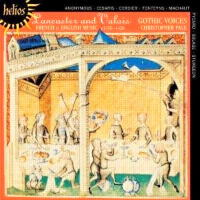
Amorous Inclinations
Early music from
England and France -
enjoyed by
KELLY FERJUTZ'... clear, vibrato-less voices ...'
|

|
Henry IV, the first Lancastrian King (son of the great John of Gaunt) was born in 1366, and his first son, Henry V was born in 1387. This Henry died in 1422, when his infant son, Henry VI, was less than a year old. Had Henry V lived longer, the current occupant of the British throne could well be from the House of Lancaster, rather than the House of Windsor. His son, Henry VI, was the last Lancastrian monarch, although Henry V's wife, Katherine of Valois was the grandmother of Henry VII, and it is her blood that runs in the veins of today's queen. Henry VII was not descended from Henry VI, but from Katherine's second husband, Owen Tudor, which is why Henry VII is Tudor, not Lancaster.
There. That's your history lesson for today.
With a bit of luck, it'll explain the title of this interesting CD -- a combination of French and English music, generally written during the seventy years or so of mostly Lancastrian rulers. I could wish they'd included the Agincourt song, as that was Henry V's greatest accomplishment. However, what is here is very interesting. (This CD is a reissue of Hyperion CDA66588, originally released in 1993.) It was recorded in Boxgrove Priory, Chichester, in 1991, and is a mixture of sacred and secular music. A good bit of commentary in the liner notes is devoted to the musical composition. If there is anything about the authors of the words, I could not find it.
The acoustics are marvelous, and serve the clear, vibrato-less voices wonderfully well. They seem nearly transparent in their clarity. The musicians consist of Margaret Philpot, alto; Rogers Covey-Crump, Andrew Tusa, Charles Daniels and Leigh Nixon, tenors; Stephen Charlesworth and Donald Greig, baritones, with Andrew Lawrence-King, medieval harp and Christopher Page, medieval lute and director. Mr Page also wrote the liner notes. Stephen Haynes provided the English translations of the lyrics.
Listen -- Pycard: Credo
(track 5, 1:15-1:45) © 1992 and 2008 Hyperion Records Ltd
The longest work here is the Credo by Pycard, at nearly six minutes, sung by two tenors and two baritones. Three of the four tenors contribute an anonymous Sanctus. The alto and two tenors are heard in the Salve mater Domini of Sturgeon. All of these are obviously sacred, as well as English. It should come as no surprise that, for the most part, the French pieces are secular, and are mostly concerned with amorous inclinations. (Even then!)
The most well-represented composer is the Frenchman Guillaume de Machaut, who lived from 1300-1377, writing music that is tuneful and somewhat exotic for its time. His Donnez, signeurs opens the CD, and many arts organizations of today might consider adopting this as their anthem. In it, he pleads with the visiting magnates to distribute largesse according to their exalted dignity. Indeed!
Listen -- Machaut: Donnez, signeurs
(track 1, 0:00-0:43) © 1992 and 2008 Hyperion Records Ltd
He is also composer of Quant je ne voy ma dame, in which few words go rather a long way; Riches d'amour et mendians in two-parts (both sung by Mr Covey-Crump) and Pas de tor en thies païs, which may be a paean to a fortress.
Listen -- Machaut: Pas de tor en thies païs
(track 10, 0:00-1:05) © 1992 and 2008 Hyperion Records Ltd
A delightful change of pace occurs midway with Le ior, an anonymous piece for the solo harp of Andrew Lawrence-King.
Listen -- Le ior
(track 7, 0:00-0:40) © 1992 and 2008 Hyperion Records Ltd
The composer Johannes Cesaris was popular in Paris, as heard by this single rondeau, Se vous sçaviez, or in Mon seul voloir/Certes m'amour -- a double version, but either are redolent of unrequited love. Poor man. He may have written these while in the service of the Dukes of Berry and Anjou.
Listen -- Cesaris: Mon seul voloir/Certes m'amour
(track 14, 1:43-2:22) © 1992 and 2008 Hyperion Records Ltd
Baude Cordier was in service to Philip the Bold of Valois, the Duke of Burgundy in the early 1400s, when he wrote this tuneful New Year's Song, Ce jour de l'an que maint.
Listen -- Cordier: Ce jour de l'an que maint
(track 15, 0:59-1:51) © 1992 and 2008 Hyperion Records Ltd
Some musicians are not well documented, as yet, but we can still listen to their music, some six hundred years later! How neat.
Copyright © 31 July 2008
Kelly Ferjutz, Cleveland USA

Lancaster and Valois - French and English Music c1350-1420
CDH55294 DDD Stereo REISSUE 59'07" 1992 and 2008 Hyperion Records Ltd
Gothic Voices: Margaret Philpot, alto; Rogers Covey-Crump, tenor; Andrew Tusa, tenor; Charles Daniels, tenor; Leigh Nixon, tenor; Stephen Charlesworth, baritone; Donald Greig, baritone; Andrew Lawrence-King, medieval harp; Christopher Page, medieval lute and director
Guillaume de Machaut (c1300-1377): Donnez, signeurs; Anonymous: Puis qu'autrement ne puis avoir; Anonymous: Soit tart, tempre, main ou soir; Solage (flourished late 14th century): Tres gentil cuer; Pycard (flourished c1410): Credo; Guillaume de Machaut: Quand je ne voy; Anonymous: Le ior; Anonymous: Avrai je ja de ma dame confort?; Guillaume de Machaut: Riches d'amour; Guillaume de Machaut: Pas de tor en thies pais; (Nicholas?) Sturgeon (died 1454): Salve mater Domini / Salve templum gracie; Anonymous: Sanctus; Fonteyns (flourished c1400): Regali ex progenie; Johannes Cesaris (flourished 1406-1417): Mon seul voloir / Certes m'amour; Baude Cordier (flourished early 15th century): Ce jour de l'an; Johannes Cesaris: Se vous scaviez, ma tres douce maistresse; Anonymous: Je veuil vivre au plaisir d'amours |
BUY CLASSICAL CDS ONLINE
EARLY MUSIC ARTICLES AT M&V
|

